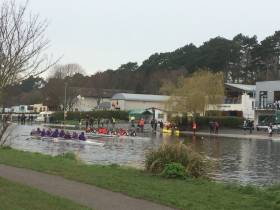Displaying items by tag: Graiguenamanagh
#Rowing: The hosts won the men's senior eights title at Trinity Regatta today. The Trinity/Lady Elizabeth crew had a length and a quarter to spare over Blue Star, a British crew which featured Scott Durant, an Olympic gold medallist, along with former Ireland internationals Cormac Folan and Niall Kenny.
The men's senior singles went to Michael Maher after a disqualification. The race featured a clash between the two Commercial men, after which Niall Beggan was disqualified.
The women's novice eight gave DULBC a chance to show their mettle. They raced Neptune in the final and won well. Bann's women's junior 18 eight looked strong and crossed the line ahead of Graiguenamanagh - but Bann were disqualified for not staying the right side of a buoy.
Brian Colsh of Sligo continued his good run by taking the men's junior 18 single, while Galway beat Blackrock in the men's junior 16 eights final.
#Rowing: The first set of finals at Neptune Regatta was a good one for UCD. Their B crew beat Neptune – by three-quarters of a length – in the competitive club one eights and their B crew beat Trinity in the novice eights. However, Trinity won the battle of the senior coxed fours – their B crew beat UCD. The host club provided be the top junior 18 eight, beating Coláiste Iognáid in the final.
The women’s junior 18 eight gave Graiguenamanagh a win over Coláiste Iognáid by a canvas, while the club one eights went to Commercial, who beat UCD B. In the closest race of the session, Katie Dolan of Commercial beat Niamh Clarke of Neptune by just one foot in the women’s junior 18 single sculls. Luke Sutton of New Ross won the men’s junior 18 single.
Neptune Regatta, Islandbridge, Saturday (Selected Results)
Men
Eight – Club One: UCD B bt Neptune ¾ l, 3:20. Novice: UCD B bt Trinity 3l, 3:30. Junior 18: Neptune bt Col Iognaid 2l, 3:27. Jun 15: Bann bt St Joseph’s 1 ½ l.
Four – Senior, coxed: Trinity B bt UCD 2l, 3:35. Masters, coxed: Athlone bt Neptune ¾ l.
Sculling, Quadruple – Jun 16, coxed: Fermoy bt Bann 3:50.
Double – Jun 16: Col na Coiribe bt Commercial A 3l, 4:01.
Single – Club Two: Clonmel (S O’Donnell) bt Garda (P Ryan) 4l, 4:25. Jun 18: New Ross (L Sutton) bt Commercial (C Kelly) easily, 4:00.
Women
Eight – Club One: Commercial bt UCD B 2l, 3:50. Jun 18: Graiguenamanagh bt Col Iognaid, canvas 3:53. Novice: UCD A bt UCD B 4l, 4:00. Jun 15: Galway bt Enniskillen 4l.
Sculling, Quadruple – Jun 16, coxed: Commercial bt Carlow 2 ½, 4:12. Double – Jun 16: Fermoy A bt Commercial B, easily, 4:34.
Single – Club Two: Clonmel (S McGrath) bt Clonmel (E Fitzpatrick) 4l. Jun 18: Commercial (K Dolan) bt Neptune (N Clarke) 1ft, 4:30.






























































